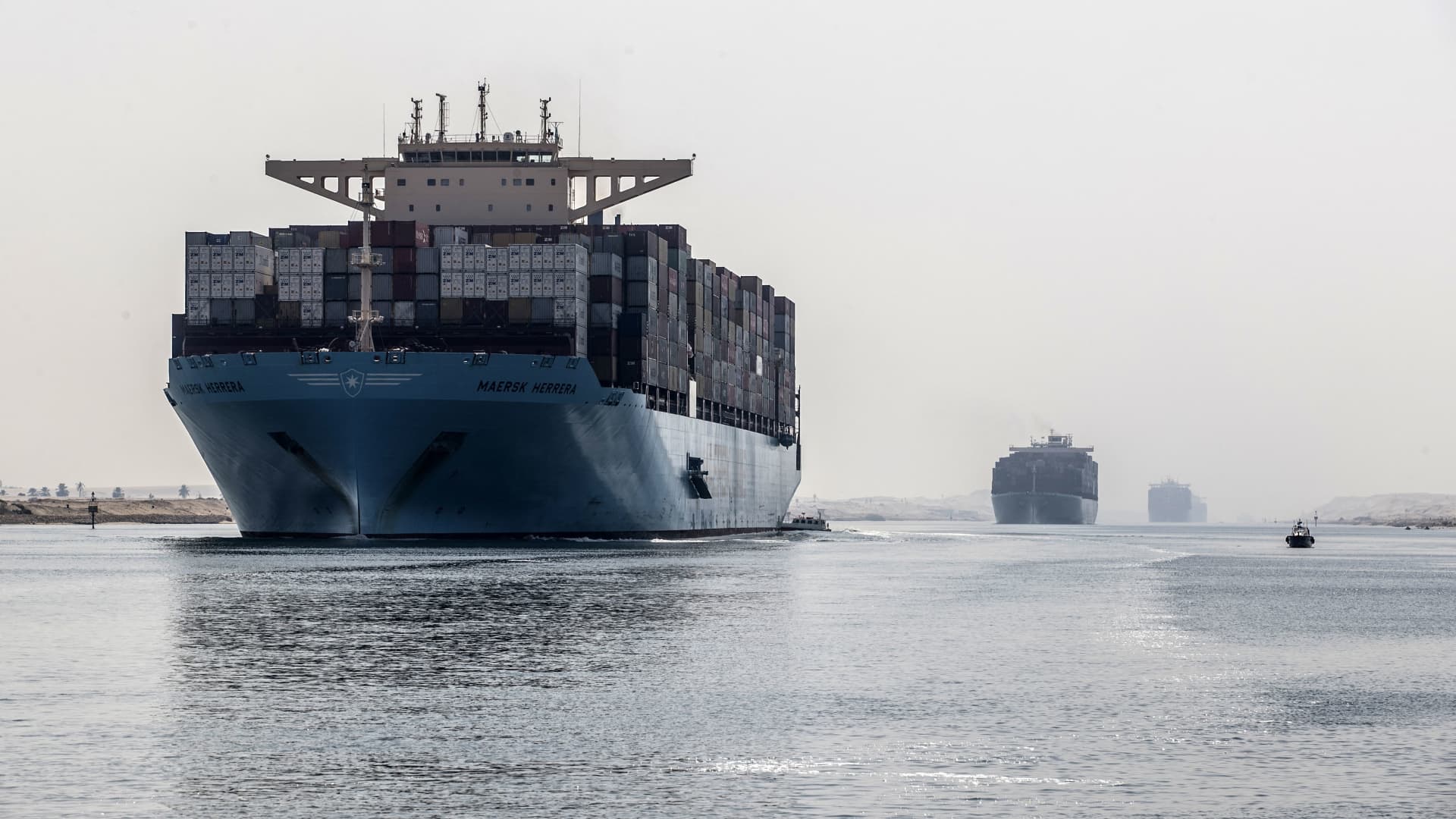A container ship sails through the new section of the Suez Canal in the Egyptian port city of Ismailia, 135 kms northeast of the capital Cairo on Octo
A container ship sails through the new section of the Suez Canal in the Egyptian port city of Ismailia, 135 kms northeast of the capital Cairo on October 10, 2019.
Khaled Desouki | AFP | Getty Images
Attacks by Iran-backed Houthi militants on ships in the Red Sea have already rocked global trade. And there could be more disruptions and price increases to come for shipments of goods and fuel.
Several major shipping lines and oil transporters have suspended their services through the Red Sea as more than a dozen vessels have come under attack since the start of the Israel-Hamas war in early October.
Now the shipping industry – and the world – are waiting to see how the United States will respond. U.S. Defense Secretary Lloyd Austin is expected to weigh in Tuesday with more specifics on the American strategy, National Security Council spokesman John Kirby told reporters Monday.
MSC, Maersk, Hapag Lloyd, CMA CGM, Yang Ming Marine Transport and Evergreen have all said they will be diverting all scheduled journeys immediately to secure the safety of their seafarers and vessels. Collectively, these ocean carriers represent around 60% of global trade.
Evergreen also said it would temporarily stop accepting any Israel-bound cargo, suspending its shipping service to Israel. Orient Overseas Container Line (OOCL), which is a part of Chinese-owned COSCO Shipping Group, has also stopped accepting Israeli cargo, citing operational issues.
“About 30% of Israeli imports come through the Red Sea on container vessels that are booked two to three months in advance for consumer or other products, meaning that if the voyage will now be extended, products with a shelf life of two to three months will not be worthwhile importing from the Far East,” said Yoni Essakov, who sits on the executive committee of the Israeli Chamber of Shipping.
“Importers will need to increase stock due to the uncertainty and pay much more and others will lose out on their markets as time to market is not competitive,” Essakov added.
On Monday, oil giant BP said it would also pause shipping activity in the Red Sea as the Yemen-based Houthis continue their attacks.
Cargo ships are seen at Israel’s Haifa commercial shipping port in the Mediterranean Sea on December 13, 2023.
Mati Milstein | Nurphoto | Getty Images
“The safety and security of our people and those working on our behalf is BP’s priority. In light of the deteriorating security situation for shipping in the Red Sea, BP has decided to temporarily pause all transits through the Red Sea,” the company said in a statement to CNBC. “We will keep this precautionary pause under ongoing review, subject to circumstances as they evolve in the region.”
Oil tanker group Frontline also said it is avoiding the Red Sea.
The attacks have already pushed ocean freight costs higher. Since the beginning of the Israel-Hamas war, the Asia-U.S. East Coast prices climbed 5% to $2,497 per 40-foot container, according to the Freightos. It could get even more expensive as major companies avoid the Suez Canal, which feeds into the Red Sea, and opt instead to go around Africa to get to the Indian Ocean.
Doing so adds up to 14 days to a shipping route, incurring higher fuel costs. And since ships take a longer time to get to their destinations, the workaround results in a perceived “vessel capacity crunch.” Delays in container and commodity deliveries are inevitable.
Container shipping represents nearly a third of all global shipping, with the estimated value of goods transported amounting to $1 trillion, according to Michael Aldwell, executive vice president of sea logistics at Kuehne+Nagel.
“Approximately 19,000 ships navigate through the Suez Canal annually,” Aldwell said. “The extended time spent on the water is anticipated to absorb 20% of the global fleet capacity, leading to potential delays in the availability of shipping resources.
There will also be delays in returning empty containers to Asia, which will only add to supply chain woes, he added.
Moody’s highlighted the delays in a note to clients.
A mock drone is displayed at a square on December 07, 2023 in Sana’a, Yemen.
Mohammed Hamoud | Getty Images
“This situation, if it extends beyond a few days, will have credit positive implications for both the container shipping industry and for tanker and dry bulk markets,” wrote Daniel Harlid, senior credit officer at Moody’s. “But it also raises the risk of further disruption to supply chains.”
Insurers are also shifting their stance, which could result in higher costs passed on to shippers and consumers. The Joint War Committee (JWC), which includes syndicate members from the Lloyd’s Market Association and representatives from the London insurance company market, said it is widening its high-risk zone to 18 degrees north from 15 degrees north.
“The Red Sea Listed Area has been extended by 3 degrees north to factor in missile range from Yemen, reflecting a dynamic and evolving situation where ship owners have already shown their awareness of developments with some significant re-routing announced,” Neil Roberts, head of marine and aviation at Lloyd’s Market Association, said in an email.
The Red Sea and the Gulf of Aden, to the south of Yemen, are already listed by the JWC, as both areas have required notification of voyages since 2009. The decision to expand the high-risk area influences underwriters’ considerations over insurance premiums.
The route shifts will also likely hurt Egypt’s already-struggling economy, which has already suffered a hit to tourism due to the Israel-Hamas war. Egypt owns, operates and maintains the Suez Canal. The Suez Canal Authority said it had generated a record $9.4 billion during the 2022-23 fiscal year.
–CNBC’s Rebecca Picciotto contributed to this report.
www.cnbc.com

COMMENTS